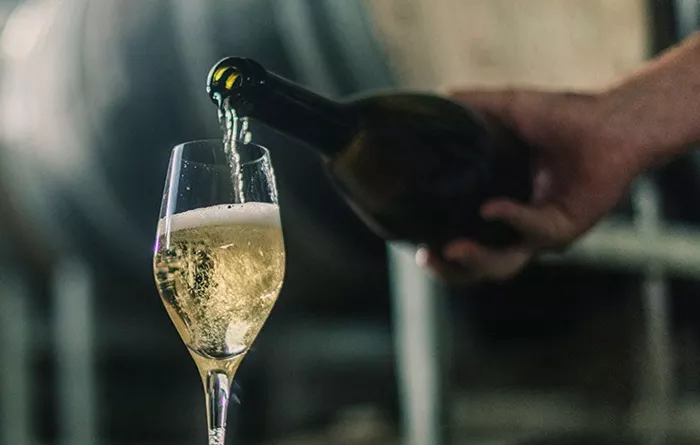In a steady winter drizzle, 30 minutes outside Bordeaux, the tiny hamlet of Pichou looks eerily quiet, save for a rugged figure in overalls and wellies, his long hair flowing behind him as he plows a muddy field with a white horse. The stark landscape offers little indication of the viticultural treasure it hides. Gone are the familiar trellises, wires, and thick vine stumps typical of Bordeaux vineyards. Instead, this patch of land—overrun with twigs, stones, and weeds—seems an unlikely home for the world’s most expensive wine.
But Loïc Pasquet, the man behind the label, steps out of a dirt-splattered van to greet visitors with unpretentious ease. The 48-year-old vintner, known for his lavish wine, is dressed in hiking boots, a fisherman’s sweater, and rain-dotted glasses, making him appear more like a working farmer than the industry figure whose creations have garnered both awe and controversy.
This was not the first time we encountered Pasquet. Our introduction came at the Golden Vines Awards in Paris in October 2023, a gala likened to the Oscars of fine wine. Pasquet’s Liber Pater 2007, priced at $4,500 a bottle, was served alongside Michelin-starred dishes by chefs Alain Ducasse and Akrame Benallal. It quickly became the talk of the evening—not just for its exceptional taste, with bold fruit and smoky undertones, but for its staggering price tag. Wine enthusiasts, sommeliers, and collectors all debated the value of a bottle that costs more than most people’s monthly rent.
Pasquet’s wine, however, is far more than just expensive. The Liber Pater brand is synonymous with a philosophy of extreme rarity and innovation, often framed as a resurrection of ancient winemaking methods. The key to Pasquet’s distinction lies in his use of ungrafted vines—a choice that sets his wines apart and contributes to their astronomical price. His vineyards, including the smaller 1.7-acre Denarius plot, are home to 100 percent native, ungrafted grape varieties that predate the phylloxera crisis of the late 19th century. These vines, known as Franc de Pied, are susceptible to the root-eating pest that devastated much of Europe’s vineyards, but Pasquet’s defiant decision to cultivate them without grafting has earned him both admirers and critics.
Denarius, Pasquet’s “second wine,” though he bristles at the term, is a more affordable offering in comparison to Liber Pater. With prices starting at around $600, it is crafted from a plot with richer clay soils, yielding a softer wine. In contrast, Liber Pater, which can fetch prices as high as $33,000 per bottle, is described by Pasquet as “elegant, more for the gods.”
Despite the substantial price gap, the underlying philosophy remains the same: both wines are made using ungrafted vines and native grape varieties. But while the Denarius is a relatively recent creation, the Liber Pater is a direct homage to the winemaking practices that existed in Bordeaux prior to the 1855 classification, the historical system that divided Bordeaux wines into five prestigious categories under the reign of Napoleon III. Pasquet’s mission is to revive the lost grape varieties that once flourished before the phylloxera plague, offering wine lovers the chance to experience a taste of history, one sip at a time.
Pasquet’s commitment to historical authenticity, however, has not come without its challenges. Since taking over the land in Pichou, he has faced backlash from some within the Bordeaux wine community, including a lawsuit accusing him of endangering the region’s vineyards by using ungrafted vines. In 2015, the controversy escalated when vandals, apparently opposed to his methods, cut down 10 percent of his vines. Yet, undeterred, Pasquet continues to champion his vision of winemaking rooted in the past. “What is the price you are ready to pay to have dinner with Napoleon?” he often asks, suggesting that the rarity and exclusivity of his wines justify their astronomical price tags.
The heart of Pasquet’s philosophy is about offering a wine experience like no other—a chance to taste what wine was before phylloxera reshaped the industry. In a world where small-production wines are often priced between $150 and $600, Pasquet’s offerings stand in stark contrast, a reflection of both his audacious vision and the unparalleled rarity of his approach.
While his methods are unconventional, Loïc Pasquet’s wines represent a fascinating intersection of tradition and innovation. Whether or not they are worth their sky-high prices, Pasquet has undeniably created a niche for himself as a guardian of forgotten grape varieties and a pioneer in resurrecting the ancient art of winemaking.
You Might Be Interested In:


